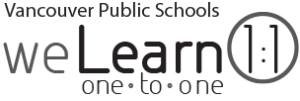 With the goal of providing students safe and productive platforms for learning, student
With the goal of providing students safe and productive platforms for learning, student
computing devices in VPS are actively monitored and managed using a number of tools. There are many ways in which we seek to meet this goal.
Device Management
At the device level, both iPads and laptops are configured in a way to limit access to those apps and software that have been identified to support instructional and productivity goals. VPS utilizes commercial device management tools used in conjunction with IT personnel to dynamically update, monitor and optimize student devices.
Internet Filtering
Given the need and desire to provide student access to the Internet, VPS additionally uses active filtering tools and strategies. At the network level, student computing devices in VPS are configured so that all Internet traffic passes through a filtering system before it reaches the student. This feature functions even if a student is using a wireless network away from school. The web filtering infrastructure includes many layers of protection to both prevent students from passively accessing inappropriate content and also prevent them from actively bypassing filter rules to intentionally access blocked content.
Given the fact that new websites emerge every second, VPS utilizes a realtime service that constantly identifies and categorizes the content of known websites on the Internet. Our IT personnel work with district teams to determine filtering categories. Based on these categories, the filter checks with the service for every new website a user accesses before determining if it is appropriate.
Because content on the web changes regularly and rapidly, there is always the chance that a website may be new, miscategorized or blocked inappropriately. District staff can manually block or unblock any website that is not handled appropriately by the website service and also report miscategorized websites to the service. Our IT personnel is regularly adding, adjusting and updating our filtering settings.
When using common search engines, our filters employ ‘Safe Search’ settings which seek to limit potentially inappropriate terms or phrases. As with the filtering of websites themselves, the dynamic nature of the web means that these settings will prevent some, but not all inappropriate use. Additionally, while some keywords are obviously inappropriate, other words have multiple meanings or can be used for both educational and inappropriate purposes. While we are confident that we employ some of the most effective filtering tools available, no system can guarantee that a student will not encounter inappropriate content
Student communications and productivity
Student email and cloud productivity tools are also actively managed. That management often alerts us to concerns regarding inappropriate use or communications. As necessary, building administrators may be notified of communications that contain inappropriate content or suggest selfharm or danger to others. Interventions at the building level will be determined by the building administrative staff.
Digital citizenship and personal responsibility
Despite these significant human and technology efforts, the dynamic nature of the web and natural curiosity of students requires teaching and supporting students in the area of digital citizenship. As part of our deployment of student devices, students complete lessons about appropriate, safe and responsible use of technology. While teachers and librarians are playing an active role in teaching and promoting digital citizenship, we welcome parents, older siblings and community partners to model and support good digital citizenship. Our weLearn website offers recommendations and resources for both teachers and parents to help support students in this area.
Communications and outreach
As part of the deployment of our 1:1 devices, VPS actively reaches out to students and parents to explain details of the weLearn 1:1 program and appropriate use of technology. Our goal is to ensure that both students and parents understand the responsibility of using mobile technology and how to be safe and productive using digital tools and the Internet.
- Parent information nights are offered to provide information and to allow parents to ask questions. These presentations and documentation are offered in four languages.
- The weLearn.vansd.org website offers detailed information about use of laptops and iPads including required forms, expectations and digital citizenship tips.
- We have also created parent outreach resources. Working with the Communications Department, we have offered simple ‘Digitalworldkids’ guides to help parents support responsible use of technology at home. These have been included in district mailers and offered to buildings for inclusion in newsletters.
- Devices are not checked out to students until both student and parent/guardian review and sign a Responsible Use form (attached). This form clearly outlines expectations of responsible use.
- Prior to receiving an iPad, students complete required ‘Digital U’ lessons that include guidance on appropriate use and digital citizenship lessons. These digital citizenship lessons include how to use the device safely and responsibly.
As we seek to prepare students to be effective users and producers of information and ideas, empowering them to be successful in college, career and life, we believe that access and use of digital tools are essential. VPS is committed to providing a safe and productive digital learning environment for all students.

